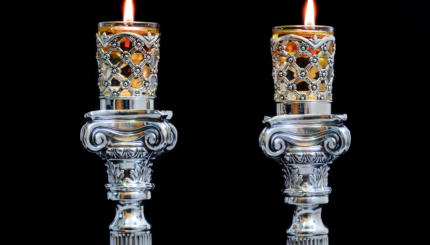Excerpted with permission from The Jewish Religion: A Companion, Oxford University Press.
The third‑century teachers Rabbi Johanan and Rabbi Abbahu debate who is the greater, the man who has never sinned or the sinner who has repented (Berakhot 34b). Their contemporary, Rabbi Simeon ben Lakish, says in one version that when the sinner repents his intentional sins are accounted as if he had committed them unintentionally; but in another version, his sins are accounted as virtues! The Talmudic reconciliation (Yoma 86b) of the two versions is that one refers to repentance out of fear, the other to repentance out of love.
One of the very few philosophical discussions of the problem of repentance is that of Joseph Albo (Ikkarim, iv. 25‑8). How can the Talmudic statement, that when a man repents out of love his sins are converted into virtues, be understood? Where is the justice in this? Surely it is enough that they are not counted as sins; why should they be turned into merit?
Albo replies that if justice were to be the determinative factor there would be no room for repentance at all. Justice demands that once the wrong has been done it can never be put right and, as ‘Wisdom’ declares in the passage from the Jerusalem Talmud quoted above, the sinner should receive his deserts. But repentance is effective as a result of God’s grace, and this is infinite. When the sinner repents out of love he responds to God in love and so God’s grace can flow in love to him, even to the extent of converting his sins into merits.
Yet Albo is still bothered by the whole idea of repentance. The sin has been committed by an act, whereas repentance involves only regret and verbal confession. Is repentance not like a man who has demolished a house seeking to rebuild it by simply declaring that it is rebuilt? Albo’s reply, anticipating Kant, is that only voluntary acts are deserving of moral praise and blame. It is notoriously difficult to define a voluntary act but for an act to be classed as voluntary rather than compulsory it is necessary for the one who performs the act to wish it to stand afterwards.
Sincere repentance demonstrates that the sin was not committed voluntarily but in error. If he could, the sinner would erase his act and he thereby demonstrates that he did not really wish it to be done. The same principle must necessarily apply to good deeds as well. If a man performs a good deed but later regrets having done it, the deed is considered to have been done involuntarily and no merit accrues to the one who has carried it out.
As in other matters, contemporary Jews interpret the classical sources on sin and repentance in accordance with their particular philosophy of Judaism and will take into account, too, modern psychological, sociological, and medical theories about the causes of criminal behavior. Not everything considered to be a sin in the traditional sources is so considered by all Jews today. Reform Jews will hardly be moved to “repent” for carrying out acts that, for Reform Judaism, are not sins at all.
Yet no Jewish thinker has ever wished to be rid of the whole idea of sin and repentance. It can be seen from an examination of the sources quoted above that the teachings on these subjects strike on the whole a balance between childish irresponsibility and softness, for which saying “sorry” is enough, and the kind of morbid guilt for which nothing done to repair the wrong is ever enough. The need to find peace in one’s soul; to shed the guilt load by constructive means, namely, by making good the harm that has been done; the renewal of one’s personal life; reconciliation with God and with other human beings; all these would be accepted by all religious Jews, whatever their particular stance, as tests of a mature religious personality.
There is no Judaism, whether ancient or modern, without teachings about the evil of sin, as there is no Judaism without teachings about the high value of repentance. Both sin and repentance are religious concepts. It is before God that one sins and it is God who pardons.
Talmud
Pronounced: TALL-mud, Origin: Hebrew, the set of teachings and commentaries on the Torah that form the basis for Jewish law. Comprised of the Mishnah and the Gemara, it contains the opinions of thousands of rabbis from different periods in Jewish history.


